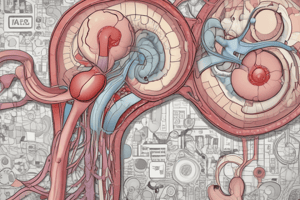Podcast
Questions and Answers
Which of the following is NOT a common cause of chronic kidney disease (CKD)?
Which of the following is NOT a common cause of chronic kidney disease (CKD)?
- Obesity (correct)
- High blood pressure
- Diabetes
- Polycystic kidney disease
What is the MAIN reason that chronic kidney disease often remains asymptomatic in its early stages?
What is the MAIN reason that chronic kidney disease often remains asymptomatic in its early stages?
- Screening for CKD is not routinely performed.
- Patients with CKD are often unaware of their condition.
- Symptoms only appear once the disease has progressed to an advanced stage.
- The kidneys have significant functional reserve and can compensate for lost function. (correct)
Which of the following is the MOST effective preventive measure for kidney stones?
Which of the following is the MOST effective preventive measure for kidney stones?
- Maintaining a sedentary lifestyle to reduce physical strain on the kidneys
- Taking medication to dissolve existing stones
- Adjusting diet to reduce stone-forming minerals (correct)
- Undergoing lithotripsy to break up larger stones
Which of the following is a common symptom of glomerulonephritis?
Which of the following is a common symptom of glomerulonephritis?
Which of the following is the MOST effective treatment for large, obstructive kidney stones?
Which of the following is the MOST effective treatment for large, obstructive kidney stones?
What is the main cause of glomerulonephritis?
What is the main cause of glomerulonephritis?
Which of the following symptoms is commonly associated with glomerulonephritis?
Which of the following symptoms is commonly associated with glomerulonephritis?
How does glomerulonephritis affect the kidneys?
How does glomerulonephritis affect the kidneys?
What is a common treatment for severe cases of glomerulonephritis?
What is a common treatment for severe cases of glomerulonephritis?
Why are regular check-ups crucial for renal diseases?
Why are regular check-ups crucial for renal diseases?
Study Notes
Renal diseases refer to various conditions that affect the kidneys. These can range from chronic illnesses to acute conditions with diverse causes. In this article, we will discuss three types of renal diseases: chronic kidney disease, kidney stones, and glomerulonephritis.
Chronic Kidney Disease
Chronic kidney disease (CKD) is a progressive condition characterized by decreased kidney function over time. It often remains asymptomatic until advanced stages, making screening essential for early detection and intervention. Causes of CKD include diabetes, high blood pressure, and inherited genetic disorders such as polycystic kidney disease. Symptoms may include proteinuria, hematuria, and edema due to reduced filtration. Treatment typically involves lifestyle modifications like dietary changes and medication to manage underlying causes, slow down progression, or support residual kidney function.
Kidney Stones
Kidney stones form when minerals accumulate in urine, creating solid masses within the kidneys or ureters. They can cause severe pain during their passage through urinary tracts. Common risk factors include dehydration, certain medications, and metabolic disorders like gout and cystinuria. Treatment varies depending on stone size and location; smaller ones may pass spontaneously while larger ones require invasive procedures like lithotripsy or surgery. Preventive measures include maintaining adequate hydration and adjusting diet based on specific mineral profiles.
Glomerulonephritis
Glomerulonephritis is inflammation of the glomeruli, tiny filtering units within the kidneys responsible for blood purification. It results from immune system dysfunction triggered by various causes such as bacterial or viral infections, autoimmune diseases, or hemodialysis complications. Symptoms include proteinuria and hematuria due to increased glomerular filtration pressure, leading to protein leakage from damaged capillaries within the kidneys. Treatment involves managing underlying conditions, anti-inflammatory medications, and supportive care like dialysis for severe cases.
In conclusion, renal diseases encompass a wide range of disorders affecting kidney function. Understanding these conditions can aid in early detection and effective management through appropriate lifestyle modifications and medical interventions. Regular check-ups are crucial as many renal diseases exhibit minimal symptoms until advanced stages.
Studying That Suits You
Use AI to generate personalized quizzes and flashcards to suit your learning preferences.
Description
Learn about chronic kidney disease, kidney stones, and glomerulonephritis - three common types of renal diseases affecting kidney function. Understand their causes, symptoms, risk factors, treatments, and preventive measures to manage these conditions effectively.




